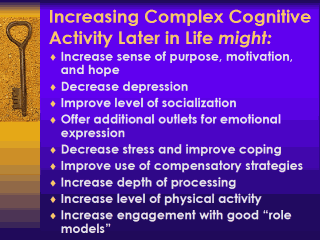 |
So I have some ideas on what might be happening. In
increasing complex cognitive activity early in life or as we go along might help but it is
kind of separate. I think that it may increase people’s sense of purpose and motivation
and their hope. It may decrease depression. It certainly may improve people’s level of
socialization because in order to participate in complex cognitive activity you need to be
out there engaging with other people. It offers additional outlets for emotional
expression. It may decrease stress and improve coping. It will improve the use of
compensatory strategies because you’ve lost too many things and you sometimes have to
find a way to get that done when it’s really not your forte. It may increase depth of
processing – how deeply people may think about things and really process it. I think it
will increase levels of physical activity because again people will be out doing things.
And it may also increase engagement with good “role models”. If it’s just getting
out there with a group of older people who are learning a new language for the first time.
They may also demonstrate other group behaviors that would help a healthy lifestyle. So
I think that increasing complex cognitive activity may certainly contribute to healthy
aging. But again from the literature that we’ve reviewed, I’m not sure that we’ve
landed where the popular literature would have us land. |
